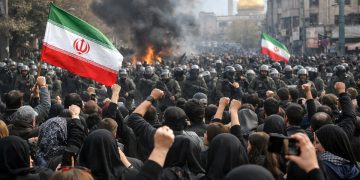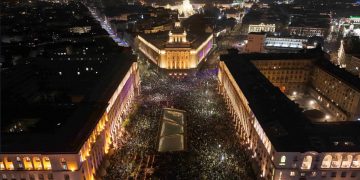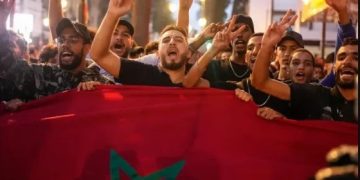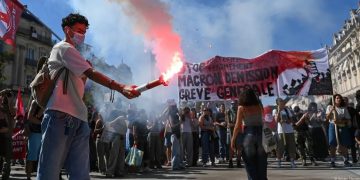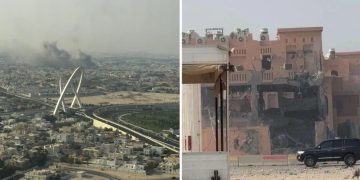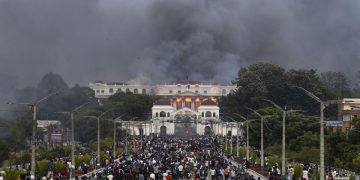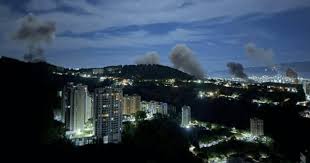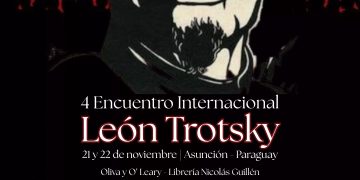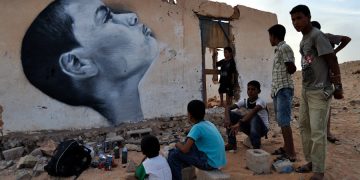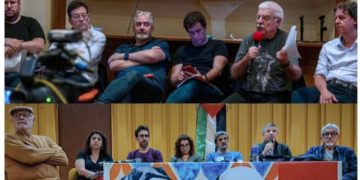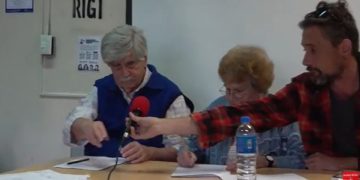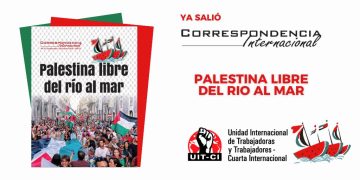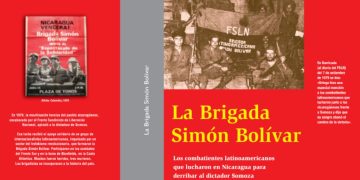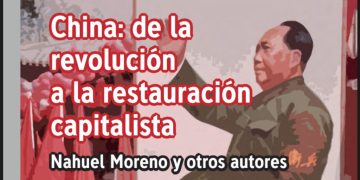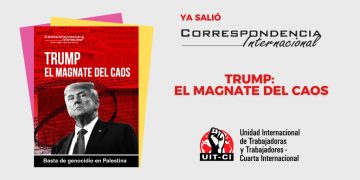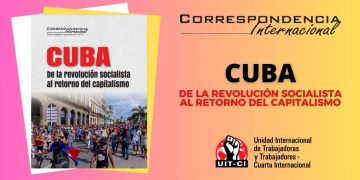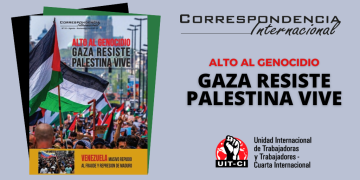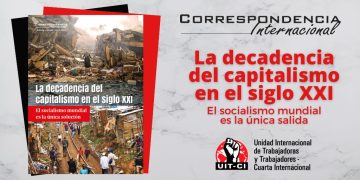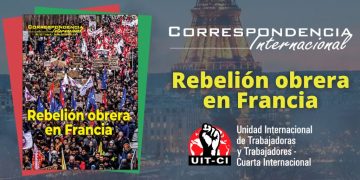When humble young unemployed peddler Tarek al-Tayeb Mohamed Bouazizi committed suicide by burning gasoline in Sidi Bouzid, Tunisia, in December 2010, in a desperate protest gesture, surely he could not even imagine the international social fire that his modest spark caused when in contact with the cumulative conditions of enormous social and political unrest in the Arab countries; bringing in a few months popular uprisings that toppled the dictator Ben Ali in Tunisia and did shake or knocked down several other old dictatorships, promoting protests and strikes in Europe.
The U.S. defeat and retreat in Iraq and the increasingly adverse situation of the U.S. and NATO invaders in Afghanistan were a crucial element in the relative loss of imperialist control, especially in the Arab and Islamic countries.
A few days after the desperate protest by the young Tunisian, very far away, an economic measure, doubling the price of gasoline in Bolivia, sparked an impressive spontaneous popular mobilization in the city of El Alto (adjacent to La Paz), which had the slogan «Either withdraw the ‘gasolinazo’ or leave.» On December 31, 2010 at 11 pm, Evo Morales, Bolivian President, annulled, scared, five days after he had issued it, the decree of increase in gasoline saying he had been «wrong».
Both events, arising from the global crisis of capitalism and anti-worker and anti-people policies of governments to try to unload the costs of this crisis on the exploited, were the prelude to the extension to the five continents of a powerful process of labour, student and popular struggles, with vanguard in Europe and Arab countries during the past two years included hundreds of strikes, armed uprisings in Arab countries (Libya, Syria, Yemen), roadblocks, large street demonstrations and a historic simultaneous general strike in the Spanish State, Italy, Greece and Portugal, in November 2012.
The «Arab spring»
In the Arab countries, the so-called «spring» became a revolutionary wave which toppled by way of popular uprisings the dictatorial regimes of Mubarak in Egypt, Ben Ali in Tunisia, Gaddafi in Libya and the dictator Saleh of Yemen. In Syria, the popular protests, violently repressed, became armed rebellion facing the dictatorship. In Mali there was a rebellion of the Tuareg, which led to an intervention by French troops. In the rest of the region, there were strong protests that shook the different regimes. In the small emirate of Bahrain it was a military intervention by Saudi Arabia which crushed the protests.
Tunisia and Egypt, now under Islamic capitalist governments, have entered a second phase, where the masses are challenging these governments which have not solved any of the basic problems and maintain the economic structure subjected to multinationals and also a strong repression. During these two years, labour strikes and popular and youth mobilizations were constant. In Tunisia, the general strike on February 8, to protest the murder of a leftist leader, was massive and in the street the people were shouting «for a second revolution».
In Libya, the new pro-imperialist government of the NTC fails to maintain order. The lack of control is so obvious that in September 2012 an armed group occupied the U.S. embassy and killed the ambassador and three other officials.
In Syria, the masses came out to confront their dictatorship. But after months of peaceful protests systematically massacred, armed uprising occurs, a civil war consolidates in which the Syrian Army of Liberation is increasingly occupying territory.
In Palestine there were also demonstrations of discontent, in this case mediated by the Israeli occupation. The Israeli imperialist enclave, police state, suffered an onset of social destabilization, with a great movement of indignation in 2011. Thus, its Zionist leaders attempt to be saved by a leap into the void, pressing the U.S. for a war with Iran. Israel only achieves national cohesion through the war of aggression. The U.S. deny permission for that war. The Zionists then attempt an attack on Gaza, in October 2012, which also fared poorly. They no longer have their ally Mubarak in Egypt. Massive demonstrations in solidarity with the Palestinians forced the Egyptian government to show solidarity and for Morsi personally go to Gaza, and U.S. imperialism to intervene directly, by Hillary Clinton, to impose a ceasefire brokered by Egypt and the United States.
Europe in the eye of the storm
Europe suffers the brunt of the economic crisis that the capitalist governments unload on workers, pensioners, immigrants and the poor. In 2010, with dozens of general strikes, Greece was at the forefront of resistance to adjustment, but the same year also saw general strikes in Italy, France, Portugal and Spain.
Since 2011 the struggles generalize and continue with five general strikes in Greece, two in Italy against Berlusconi, massive mobilizations of «Indignados» (outraged) in Spain and Portugal. In Germany there were important sectorial stoppages in Lufthansa. In Belgium there was a general strike in 2011 and another in early 2012, and transport strikes in Italy and Portugal. Except for the «Indignados» movement, these fights were under the control of the union bureaucracy. In Britain there were major strikes of 400,000 state workers in April and in December 2011 there were two million workers — the biggest strike since 1926 — with mass demonstrations of hundreds of thousands. In the Spanish state there were two general strikes in 2012.
Worth noting is the great strike of coal miners of Asturias and Leon, which, although it did not achieved victory shook the Spanish State for its combativeness. They confronted the police, blocked roads and came to Madrid to say no to the liquidation of coal mining. But the combat of the miners went further beyond, by proposing, through example, radical methods of struggle to deal with the adjustment.
The effect of general strikes and mass mobilizations begins to produce government crises: in Portugal the Socrates government fell, in Greece Papandreou fell, Berlusconi in Italy and in Ireland Brian Cowen. The lack of revolutionary alternatives allows new Governments of adjustment, «technical» in Italy and Greece. In the latter case appears SYRIZA, left electoral alternative denouncing the adjustment (albeit with a contradictory program, defending the permanence in the European Union), which disputed the elections, obtaining 27% of the vote in June 2012.
This process takes a major step forward with the «European general strike» of November 14, which actually was a general strike in the Spanish State, Portugal, Italy and Greece, partial in Belgium and mobilizations in other countries.
Struggles become widespread
The struggles also were spreading in Latin America. After the fall of bourgeois governments due to popular demonstrations in Argentina, Peru, Ecuador, Bolivia and the defeat of the 2002 pro-imperialist coup in Venezuela in the past decade, Latin America achieved a partial stabilization based on new governments with populist traits and with partial and sporadic clashes with imperialism, but above all with a double discourse and thanks to the good prices of mineral and agricultural raw materials that allowed them to make some concessions.
However, in the last two years the adjustment plans returned, imperialist plunder sharpened and strong social struggles resurfaced in four key fronts:
1) labour struggles for wages and other claims against the adjustment plans. Noticeable, the strikes and demonstrations in Bolivia and especially the fight against the «gasolinazo», on December 2010, which put at risk the stability of the government of Evo Morales and forced him to back down in five days; general strike in Argentina; strikes of dams and public service workers (fire fighters, transportation, universities) in Brazil; strikes in Panama against layoffs and loss of labour gains; teachers strike in Honduras; of teachers and doctors in Peru; health workers strike in Bolivia, of teachers in Mexico; miners strikes in Chile; labour strikes in basic industries, health and teachers in Venezuela. Brazil also saw the strike of lecturers and university workers that lasted four months, with the support of large student sectors.
2) Anti-imperialist struggle against transnational mining and environmental depredation. They became widespread in several Latin American countries, mainly in Peru (Cajamarca and Puno), Panama, Argentina and Colombia.
3) Students fight for the right to education. The Chilean students have several years of huge demonstrations, which have achieved immense social support and undermine the government of Piñera which reached its lowest levels of popularity; in Colombia college students, with a general strike and demonstrations forced the government to reverse a privatizing law.
4) Indigenous struggles in defence of their territories in Brazil, Argentina, the Chilean Mapuche facing a harsh state repression and in Bolivia the conflict in defence of Tipnis National Park, against the project of IIRSA (South American Regional Integration Initiative), which provides a highway in the middle of their territory and national park, forcing Evo Morales to cancel the construction of the highway, but the struggle continues, because the government tries to impose it again.
In the United States, the movement «Occupy Wall Street» was the new fact that mobilized hundreds of thousands of young people throughout the country, with the slogan «We are the 99% vs. 1% of bankers and rich.» This movement was defined as internationalist, in connection with the European outraged and talking of mankind as a whole. It went so far as to call for a general strike on May 1st in the whole country. While not achieved, sectors of the vanguard protested in dozens of cities. There were also strikes and demonstrations against cuts in states like Wisconsin that managed to get the State to partially step back and a week-long strike of 26,000 teachers in Chicago in September 2012 against the privatization of education. And strikes in large private companies like Verizon, 45,000 workers, who stopped for more than two weeks, and Wal Mart workers for their working hours and conditions. This slow awakening of the American working class has a strategic importance for world revolution.
Puerto Rico, the U.S. Latin American colony, lived a long student strike in defence of the right to education for all, as in Chile. Canada also was moved by powerful student strikes, with claims against the high costs of education.
The other giant, the Chinese working class, with 200 million industrial workers enslaved by multinationals, has also set in motion facing wild capitalism and the dictatorship of the Chinese CP and their state unions, which must officially be «mediators» in case of strike and not defend the workers. For some years, workers and popular sectors began to fight for their social rights, wages and against pollution. In 2011 the wave of strikes was so big that not only extracted wage increases in the striking factories, but a general wage increase of 30% average (with variation in provinces). That is, the Chinese working class has begun to fight and has won important economically (ILO speaks of an average salary of US$250 in private companies which is still very low, but is three times what was 10 years ago) and organizational advances in sectors of the vanguard.
In India, the other Asian giant, strikes for the rights of workers and wages proliferated. And there were three large widespread strikes: a worker strike in 5000 construction, metallurgical, coal mining and transportation companies in February 2012, another of 50 million merchants in October of that year, against economic plans that facilitated the penetration of commercial multinational monopolies and one of more than 100 million workers in February 2013. And mass demonstrations were held against the growth of rape and murder of women.
Thousands of strikes occurred in Bangladesh, Pakistan, Vietnam, Cambodia, in all the Asian «factory countries» of cheap labour. In Indonesia there was a general strike of three million workers in October 2012 demanding wage and the end of precarious work. In South Korea stopped the 45,000 workers of the Hyundai automobile plant for working conditions.
In this review we also want to highlight the mining strikes in South Africa, which is the leading sector of its economy. They surprised the world with the slaughter by police of 34 miners in the Marikana mine and with the heroic combativeness of the miners who continued their fight with armed workers picketing; they spread the strikes to other mines and achieved conquests. And behind them, other sectors of the working class went on strike.
Solidarity with the struggles of the world
But this enormous rise of struggles does not have a revolutionary socialist leadership. This crisis of revolutionary leadership is now more serious than ever. Struggles achieve partial victories or topple dictatorships in Arab countries. But they cannot impose a fundamental solution to poverty. Their triumphs will be precarious, while the power of capitalists and imperialism is not liquidated.
Exactly, there is no revolutionary international leadership to convene together all these immense struggles to defeat imperialism and the capitalist governments. Of course, the battles of the working class, youth and popular sectors feed the emergence of a vanguard of fighters in all countries. This is the basis to keep on giving the fight for the construction of new political and trade union alternatives.
Meanwhile, the task of revolutionaries is to summon the unconditional solidarity of all labour and popular struggles of the world against imperialism, governments and the treacherous trade union bureaucracies.








